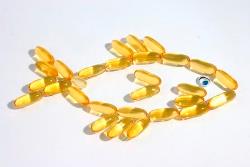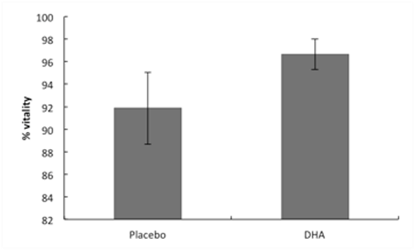Вы здесь
DHA Omega-3 Supplement in Mom's Diet Boosts Stem Cells in Baby's Cord Blood

(image courtesy of Seafood New Zealand)
Omega-3 fatty acids are called "essential" because they are required for a healthy metabolism. Humans and other mammals must ingest the simplest essential fatty acids in their diet, because their bodies cannot synthesize them. The best dietary source is fish oil. Docosahexaenoic acid (DHA) is a more complex fatty acid that our bodies can manufacture to a limited extent.
DHA is a primary structural component of the human brain, cerebral cortex, skin, sperm, testicles and retina. In young men, DHA levels tend to follow their diet, whereas young women and especially pregnant or lactating women manufacture higher levels of DHA [1]. Efforts to link DHA consumption with brain behaviors, such as ADHD in children or Alzheimer's Disease in older adults, are an active area of research.
Studies of whether DHA consumption during pregnancy helps babies have had mixed results. Some studies find that DHA supplements improve infant brain and eye development, or that they benefit preterm babies and mothers with post-partum depression. Olsen found that when expectant mothers consumed large quantities of fish, rich in DHA, there was an increase in the gestational age of their babies, a greater foetal weight at birth, and less incidence of pre-eclampsia during pregnancy [2].
The American Congress of Obstetricians and Gynecologists (ACOG) has no recommendation on the subject of DHA supplements during pregnancy, even though DHA is recommended by the U.S. Institute of Medicine (IoM) and the World Health Organization (WHO) [3]. Nonetheless, many individual doctors and dieticians encourage DHA consumption during pregnancy [4].
SmartBank has conducted a study of how DHA consumption during pregnancy impacts the stem cell concentration in newborn cord blood. Denburg et al. were the first to test this in a randomized study; they found that pregnant women who received fish oil capsules from gestation week 20 until delivery had a higher CD34+ percentage (a measure of stem cells) in their baby's cord blood [5].
The metabolic demand for DHA increases over the course of pregnancy, reaching peak during the third trimester. In line with this observation, the SmartBank trial enrolled two groups of participants: women at 20 and 28 weeks of gestation (40 and 64 expectant mothers, respectively). Each trial group was randomly divided between a study arm and a control arm. All of the participants ingested a daily oil capsule through week 40. On the study arm the capsules contained 250mg DHA, whereas the control arm received 250mg olive oil. The level of DHA in participant's blood was tested at the start of the study and at week 37-38.
Cord blood was collected from all of the babies delivered by mothers in the study, as well as a reference group of 44 deliveries at the same hospital. The stem cell count of the cord blood was tested by flow cytometry within 48 hours of collection.

As this figure shows, the SmartBank trial found that women who received DHA supplements had a significantly higher stem cell viability (measured by 7-AAD assay) in their cord blood than the control group. Moreover, the concentration of Total Nucleated Cells (TNC/ml) in their cord blood was correlated (not shown) with the concentration of DHA (%).
We conclude that this simple dietary supplement can help improve the yield of cord blood collections.
References
- Giltay EJ, Gooren L J G, Toorians AWFT, Katan MB, & Zock PL. Docosahexanoic acid concentrations are higher in women than in men because of estrogenic effects. Amer. J. Clin. Nutr. 2004; 80(5): 1167-1174. html
- Olsen SF & Secher NJ. A possible preventive effect of low-dose fish oil on early delivery and pre-eclampsia: indications from a 50 year old controlled trial. Br.J. Nutr 1990; 64(3):599-609 PMID:2265175
- Linda D. Bradley, MD, Beth Reardon, MS RD LDN, John M. Thorp, Jr. MD, Barbara A. Underwood, PhD, & Fernando E. Viteri, MD, ScD Clinical Update: Women's Health and Nutrition - Demographic Challenges Supplement to Ob. Gyn. News 2009 pdf
- Keli Hawthorne, Dietitian & Expert Author for BabyCenter.com Is it safe to take a fish oil or other omega-3 supplement during pregnancy? answer
- Denburg JA, Hatfield HM, Cyr MM, Hayes L, Holt PG, Sehmi R, Dunstan JA & Prescott SL. Fish Oil Supplementation in Pregnancy Modifies Neonatal Progenitors at Birth in Infants at Risk of Atopy 2005; Pediatric Research 57:276-281; doi:10.1203/01.PDR.0000148279.72611.1D PMID:24232253.


